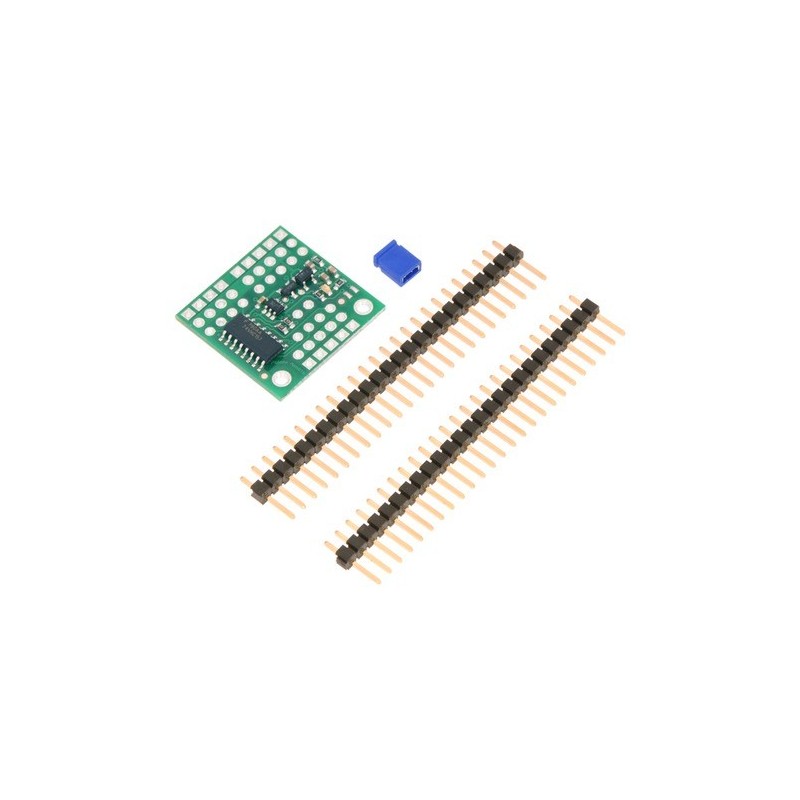



41,74 zł Netto
Czterokanałowy multiplekser w wersji Partial Kit zapewnia niezawodne przełączanie czterech kanałów RC pomiędzy dwoma źródłami sygnału, oferując jednocześnie dużą elastyczność montażu. Moduł sprawdzi się w projektach robotycznych, modelarskich oraz systemach autonomicznych, gdzie wymagane jest dynamiczne przełączanie sterowania lub zwiększenie bezpieczeństwa i kontroli nad sygnałami RC. Pololu 2807
Kompaktowy, czterokanałowy multiplekser sygnałów RC przeznaczony do przełączania sterowania serwami lub regulatorami ESC pomiędzy dwoma niezależnymi źródłami sygnału. Moduł umożliwia wybór aktywnego źródła (MASTER lub SLAVE) za pomocą dodatkowego kanału sterującego SEL, analizując szerokość impulsu RC. Rozwiązanie znajduje zastosowanie m.in. w systemach szkoleniowych typu „buddy”, projektach z przełączaniem pomiędzy sterowaniem ręcznym i autonomicznym oraz w instalacjach wymagających redundancji sterowania.
Wersja Partial Kit dostarczana jest z elementami SMD już zamontowanymi, natomiast elementy przewlekane wymagają samodzielnego lutowania, co pozwala na elastyczne dopasowanie połączeń i bardziej kompaktowy montaż.
Producent BTC Korporacja sp. z o. o. Lwowska 5 05-120 Legionowo Polska sprzedaz@kamami.pl 22 767 36 20
Osoba odpowiedzialna BTC Korporacja sp. z o. o. Lwowska 5 05-120 Legionowo Polska sprzedaz@kamami.pl 22 767 36 20
Moduł 16-kanałowego sterownika serw z interfejsem I2C oparty o układ PCA9685. Adafruit 815
Moduł z 16-kanałowym generatorem PWM umożliwiający np. kontrolę silników DC, obsługę serwomechanizmów lub sterowanie diodami LED. Magistrala SPI, rozdzielczość sygnału PWM 12 bitów.
BOB-10616
Brak towaru
Kontroler OpenServo umożliwia rozbudowę standardowych serw modelarskich o zaawansowane funkcje sterowania i sprzężenia zwrotnego. Rozwiązanie sprawdza się w projektach robotycznych, edukacyjnych oraz badawczych, gdzie istotne pozostają precyzja sterowania, elastyczność konfiguracji i dostęp do parametrów pracy napędu. ROB-09014
Czterokanałowy multiplekser w wersji Partial Kit zapewnia niezawodne przełączanie czterech kanałów RC pomiędzy dwoma źródłami sygnału, oferując jednocześnie dużą elastyczność montażu. Moduł sprawdzi się w projektach robotycznych, modelarskich oraz systemach autonomicznych, gdzie wymagane jest dynamiczne przełączanie sterowania lub zwiększenie bezpieczeństwa i kontroli nad sygnałami RC. Pololu 2807
Multiplexer w wersji zmontowanej umożliwia szybkie i niezawodne przełączanie czterech kanałów RC pomiędzy dwoma źródłami sterowania bez potrzeby lutowania. Moduł sprawdzi się w systemach szkoleniowych typu „buddy”, projektach z przełączaniem sterowania ręcznego i autonomicznego oraz w aplikacjach wymagających bezpiecznego i elastycznego zarządzania sygnałami RC. Pololu 2806
Rozszerzenie typu shield dla Arduino ze sterownikiem PWM 16-kanałowym, 12-bitowym pozwalającym na równoczesne sterowanie 16 serwomechanizmami za pomocą interfejsu I2C. Adafruit 1411
Brak towaru
Adafruit Motorshield to shield umożliwiający łatwe sterowanie silnikami DC, krokowymi oraz serwomechanizmami przy pomocy Arduino. Zawiera sterowniki silników DC, krokowych oraz wyjścia do sterowania serwomechanizmami. Umożliwia adresowanie oraz łączenie ekspanderów (do 32) i sterowanie przy pomocy jednej płytki Arduino. Adafruit 1438
Płytka rozszerzeniowa do minikomputera Raspberry Pi dodająca możliwość sterowania do 16 serw sygnałem PWM. Potrafi generować sygnał do 1,6 kHz z 12-bitową rozdzielczością. Dzięki sterowaniu za pomocą interfejsu I2C, do równoczesnego sterowania serw wystarczy użycie 2 pinów. Adafruit 2327
Moduł do sterowania serwem. Parametry pracy konfigurowane są za pomocą potencjometrów umieszczonych na płytce. SparkFun WIG-13118
Brak towaru
Płytka generuje 16 sygnałów PWM i komunikuje się za pomocą cyfrowego interfejsu I2C, posiada wbudowany układ PCA9685. MOD-71
Ten moduł umożliwia rozszerzenie możliwości płytek serii Feather o 8 12-bitowych wyjść PWM, których można użyć np. do sterowania serwami lub diodami LED. Adafruit 2928
Płytka umożliwiająca sterowanie serwomechanizmem bez konieczności programowania. Sparkfun WIG-13872
Brak towaru
Sterownik serwomechanizmów do zestawów FPGA TerasIC serii DE umożliwia sterowanie maksymalnie 24 serwomechanizmami. Dostarcza napięcie 6 V do zasilania serwomechanizmów. W zestawie serwomechanizm MG966R i taśma do połączenia z zestawem FPGA. P0288
Sterownik serw w postaci shieldu Arduino. Pozwala sterować 7 serwami z serii Dynamixel AX. Komunikacja odbywa się za pomocą interfejsu SPI. DFRobot DRI0027
Brak towaru
Moduł HAT ze sterownikiem serw PCA9685 przeznaczony do minikomputerów Raspberry Pi. Płytka wyposażona została w złącze 40-pinowe. Adafruit 3416
Moduł rozszerzeń przeznaczony do współpracy z micro:bit. Pozwala na sterownie 4 silnikami DC lub dwoma silnikami krokowymi i 8 serwami. Komunikuje się przez interfejs I2C. DFRobot DFR0548

Czterokanałowy multiplekser w wersji Partial Kit zapewnia niezawodne przełączanie czterech kanałów RC pomiędzy dwoma źródłami sygnału, oferując jednocześnie dużą elastyczność montażu. Moduł sprawdzi się w projektach robotycznych, modelarskich oraz systemach autonomicznych, gdzie wymagane jest dynamiczne przełączanie sterowania lub zwiększenie bezpieczeństwa i kontroli nad sygnałami RC. Pololu 2807
